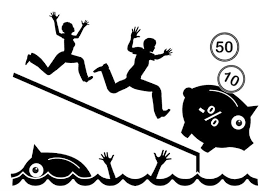Central bank after central bank is either backing away from raising rates or they are embracing lower rates. The following stories will illustrate what we have stated all along is coming into play. While inflation remains an issue (money is being created at an unprecedented rate), inflationary forces are being held back due to advancements in technology and AI and price wars. The stories below once again illustrate the power of following trends. The news follows the trend and not the other way around. So all you need to do is identify the trend correctly and sit back.
RBNZ Reform Could Potentially Lower Rates, Finance Minister Says
Reforming the Reserve Bank of New Zealand’s monetary policy mandate could potentially result in lower interest rates, the new finance minister said.
Requiring the central bank to target full employment as well as price stability when making rate decisions will ensure its objectives are more aligned with the well-being of New Zealanders, Grant Robertson said in a television interview Sunday. When asked if that meant lower interest rates, he said: “Potentially, it could.”
“What it means is that when the Reserve Bank is making its decisions about the official cash rate, when it’s thinking about monetary policy, of course it thinks about managing and controlling inflation, and that’s vital,” said Robertson. “But also it thinks about other goals in the economy such as making sure that we maximize employment.” Full Story
Bank of Russia Opts for Smaller Rate Cut as Caution Wins Out
Russia’s central bank reduced borrowing costs for a fifth time this year, decelerating the pace of monetary easing in an acknowledgement that an unprecedented period of disinflation may be coming to a close. Full Story
Brazil Cuts Key Rate to 7.5% and Indicates Slower Easing
Brazil lowered borrowing costs by 75 basis points, and signaled it will slow the pace of monetary easing further as inflation bottoms out and the economy gains steam. Full Story
Stocks tread higher, dollar soars after ECB decision to extend QE stimulus
Stocks (^DJI, ^GSPC, ^IXIC) and the dollar are trading higher after the ECB announced a decision to extend its QE stimulus program and stand pat on rates. The materials (XLB) and financial (XLF) sectors are most in the green, and the real estate (XLRE) and health care (XLV) sectors are most in the red. Alan Valdes of Silverbear Capital joins us live from the floor of the New York Stock Exchange to talk markets. To discuss the other big stories of the day, Alexis Christoforous is joined by Yahoo Finance’s Nicole Sinclair and Dan Roberts. Alexis also talks to Dan Howley about why web developers may not have as much fun as you think they do. Nicole Sinclair also interviews UPS CEO David Abney about holiday price hikes. Full Story
Canadian dollar slumps as BOC leaves rates unchanged
The Canadian dollar fell to its lowest level since mid-July against the U.S. dollar on Wednesday after the Bank of Canada left its key interest rate unchanged at 1%. Traders had anticipated the central bank to keep rates on hold during the October meeting after Canadian economic data was mixed of late, including a big miss in retail sales data last week. BOC Gov. Stephen Poloz also continuously reiterated that policy decisions would be data-driven, causing traders to adjust their expectations. Yet, the U.S. dollar jumped to a three-month high against its Canadian counterpart USDCAD, +0.4282% buying $1.2770 versus C$1.2675 late Tuesday. full story
Energy-rich Norway leaves policy rate unchanged
The general outlook for the oil- and gas-rich economy of Norway hasn’t changed so lending rates will stay the same, the head of the central bank said.
Norge Bank, the country’s central bank, said Thursday the economy was struggling to pick up the pace, with inflation expected to stay below 2.5 percent over the next few years. Though the labor market is gaining strength, the value of the currency, the krone, is weaker than expected and the bank said it was keeping its key policy rate at 0.5 percent.
“The outlook and the balance of risks for the Norwegian economy do not appear to have changed substantially since the September report,” Governor Øystein Olsen said in a statement. “The executive board therefore decided to keep the key policy rate unchanged at this meeting.” Full Story
To the above list, we can add Central banks of Singapore, South Africa, Japan, etc. While British Central bankers want to raise rates, they are playing the same game Canada and US banks played. Raise rates a bit to give the illusion all is well and to widen their wiggle room. Canadian bankers backed away after just one rate hike, clearly, illustrating that they were full of hot air.
Other Articles of Interest
Stock market Crash Myths and Realities (Jan 3)
Bull-Bear Markets & Arrogance (Jan 1)
Will The Stock Market Crash In 2018 (Dec 11)
Has US Dollar Finally Hit Bottom (Dec 6)
BitCoin Has Done What Precious Metals Never Could (Dec 4)
Experts Making Stock Market Crash Forecasts usually know nothing (Nov 17)
1987 stock market crash anniversary discussions- nothing but rubbish ( Oct 24)
Dow 22K Predicted In July 2017; Next Target Dow 30k? (Oct 15)
Anxiety and Greed Index Don’t Support Stock Market Crash (Oct 14)
Fed States Inflation is not an issue? (Oct 13)
Is Bitcoin a Bubble or Good Investment? (Oct 9)
Stock market crash; best time to buy stocks (Oct 6)
Nasdaq’s Achievement Topples Stock Market Crash Argument (Oct 5)



